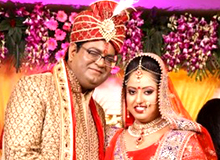Outsiders might think there is a clear dichotomy between dating and matrimony, but that is not the case in India. Rather, it is a continuum, with varying degrees of arrangement and free choice and a tremendous amount of overlap between the two.
So, while earlier – before dating apps were available – people used matrimonial sites to find dates, now, people use dating apps to find a spouse.
More than three million Indians have downloaded the popular dating app Woo.
“Most people are looking at a process of courtship that ends in marriage. They want to get to know the person and find the best fit,” says co-founder Sumesh Menon.
Before meeting through Woo in November 2014, 30-year-olds Kartik and Shruti Arora had half-heartedly been letting their parents find a partner for them.
A few chat sessions followed, then some face-to-face meetings during which everything, as Shruti tells it, “clicked into place”.
The final seal of approval came when the parents met. The pair married four months later.
“I didn’t want to upset my parents, but I wanted to be in charge of my life,” says Shruti. “The important thing about these apps is their social acceptance. Because no one is embarrassed about using them, they are changing the face of marriage here, and everyone, including the parents, is happy.”
Woo demonstrates the rise of home-grown dating apps in India. While Tinder is well known, the indigenous online offerings are tailored to Indian cultural needs.
Woo demonstrates the rise of home-grown dating apps in India. While Tinder is well known, the indigenous online offerings are tailored to Indian cultural needs.
For example, Woo, which largely works on matching people based on their interests, withholds the names of women and makes users answer a set of questions before allowing them to chat. This helps women feel safer.
Other apps that have cropped up in India include Aisle, which describes itself as a cross between a dating and a matrimonial app. It asks for detailed information about your appearance and background.
Another offering is Floh (Find Life Over Here), which operates in 15 cities and five countries. It was started to help people who connect online meet offline, and it hosts matchmaking events throughout the year.
Floh believes you don’t meet someone through an algorithm but through real life interaction. The events it organises – themed around music, food or a sport – are usually limited to about 30 people.
Woo’s Menon says it is too soon to write off the matrimonial websites, though. Dating apps and matrimonial sites currently coexist because they cater to different audiences.
“But five years down the line, more young Indians will connect via products like ours because they will want to take the decision of a life partner into their own hands, and dating apps will be their first port of call,” he says.p>
“Yes, parents are important. But at the end of the process – to approve a choice – rather than leading it.”
Perhaps even more important than finding the right partner, what online marriage apps offer is some sense of control.
For Nitin Agarwal, a 28-year-old software engineer in New Delhi, the parental pressure to get married began a year ago. His repeated attempts to find the “right girl” in his social circles were not working out. But thanks to the online options, Agarwal feels all is not lost.
“I knew either I had to keep waiting for her to turn up – and my parents would have fretted about how long it was taking. Or I had to resign myself to my parents choosing my marriage partner,” he says.
Click here to read the coverage as it appeared on (THE NATIONAL)


